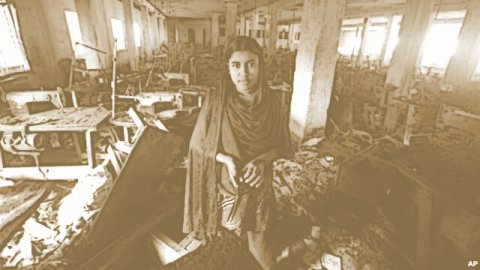International Health and Safety Accord

Since 2005, MSN has been working with Bangladeshi labour organizations and international allies to expose and remedy unsafe working conditions in the country’s garment industry and to pressure international brands to compensate the survivors of factory disasters and eliminate unsafe conditions and practices in their supplier factories. That work was broadened under the 2021 International Accord.
Bangladesh and International Accords
Following the Rana Plaza factory building collapse in 2013, labour unions and apparel brands have negotiated a series of agreements to better protect the health and safety of garment workers in Bangladesh.
The precedent-setting, legally-binding Accord on Fire and Building Safety in Bangladesh was created in the immediate aftermath of the collapse and achieved significant improvements to factory safety.
In September 2021, the International Accord for Health and Safety in the Textile and Garment Industry took effect, preserving the key elements of the original Accord and potentially expanding its application to other countries.
Building on the achievements of the ground-breaking Bangladesh Accord, the International Accord includes independent garment and textile factory inspections, legally enforceable brand commitments, independent oversight of brand compliance, brand support to ensure that suppliers can afford to make necessary safety upgrades, and the obligation to stop working with factories that do not implement corrective action.
The Maquila Solidarity Network is a witness signatory to the Accord, along with the Clean Clothes Campaign, Worker Rights Consortium, and Global Labor Justice-International Labor Rights Forum.
Loblaw (Joe Fresh) is the only major Canadian company that has signed.
Pakistan Health and Safety Accord
At the end of 2022, the International Accord was officially extended to Pakistan. Hundreds of factories in Pakistan producing apparel products for signatory brands and retailers will be the subject of independent health and safety inspections. Garment and textile workers in the country will also receive health and safety training and have the right to file anonymous complaints when violations at those factories take place.
The hope is that this live-saving agreement will be extended to other countries where health and safety issues continue to put workers’ lives at risk.
For more information:
- International Accord website with current list of signatories
- Agreement reached to expand safety accord to Pakistan (MSN)
- Ten years after Rana Plaza tragedy, labour rights movement calls for legally binding agreements and HRDD legislation (MSN)
- Rana Plaza timeline on the history of the fight for freedom of association in Bangladesh (CCC)
- Clean Clothes Campaign brand tracker
- Background on fire and building safety in Bangladesh
